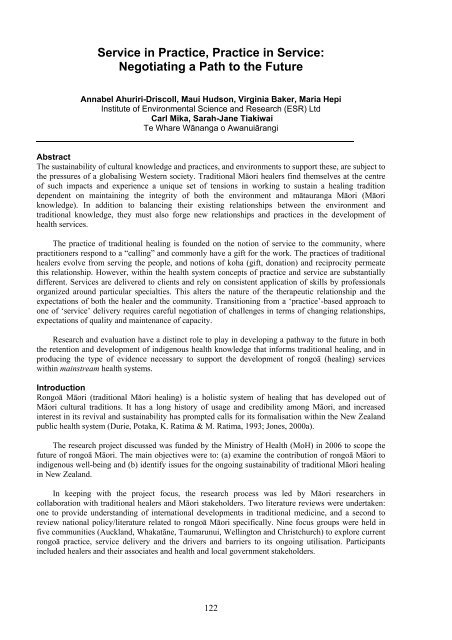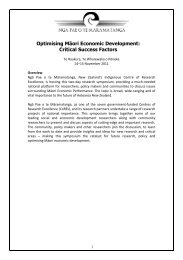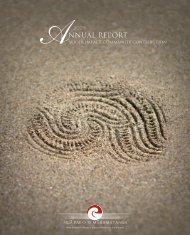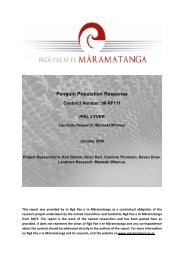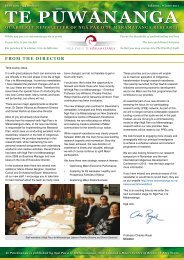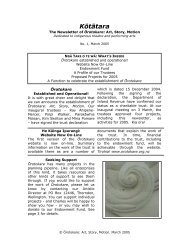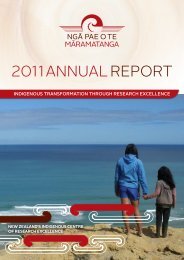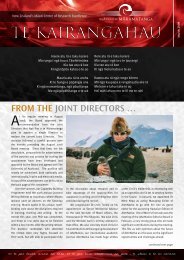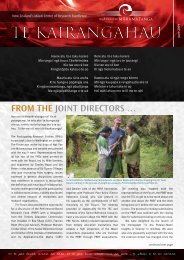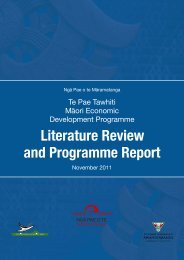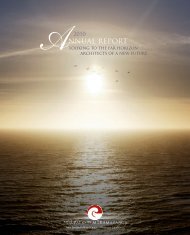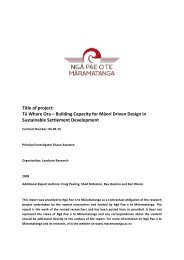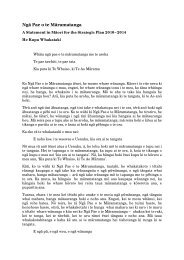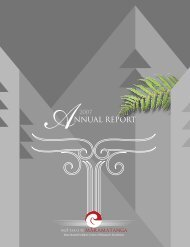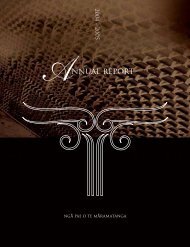traditional knowledge conference 2008 te tatau pounamu
traditional knowledge conference 2008 te tatau pounamu
traditional knowledge conference 2008 te tatau pounamu
Create successful ePaper yourself
Turn your PDF publications into a flip-book with our unique Google optimized e-Paper software.
Service in Practice, Practice in Service:Negotiating a Path to the FutureAnnabel Ahuriri-Driscoll, Maui Hudson, Virginia Baker, Maria HepiInstitu<strong>te</strong> of Environmental Science and Research (ESR) LtdCarl Mika, Sarah-Jane TiakiwaiTe Whare Wānanga o AwanuiārangiAbstractThe sustainability of cultural <strong>knowledge</strong> and practices, and environments to support these, are subject tothe pressures of a globalising Wes<strong>te</strong>rn society. Traditional Māori healers find themselves at the centreof such impacts and experience a unique set of <strong>te</strong>nsions in working to sustain a healing traditiondependent on maintaining the in<strong>te</strong>grity of both the environment and mātauranga Māori (Māori<strong>knowledge</strong>). In addition to balancing their existing relationships between the environment and<strong>traditional</strong> <strong>knowledge</strong>, they must also forge new relationships and practices in the development ofhealth services.The practice of <strong>traditional</strong> healing is founded on the notion of service to the community, wherepractitioners respond to a “calling” and commonly have a gift for the work. The practices of <strong>traditional</strong>healers evolve from serving the people, and notions of koha (gift, donation) and reciprocity permea<strong>te</strong>this relationship. However, within the health sys<strong>te</strong>m concepts of practice and service are substantiallydifferent. Services are delivered to clients and rely on consis<strong>te</strong>nt application of skills by professionalsorganized around particular specialties. This al<strong>te</strong>rs the nature of the therapeutic relationship and theexpectations of both the healer and the community. Transitioning from a ‘practice’-based approach toone of ‘service’ delivery requires careful negotiation of challenges in <strong>te</strong>rms of changing relationships,expectations of quality and main<strong>te</strong>nance of capacity.Research and evaluation have a distinct role to play in developing a pathway to the future in boththe re<strong>te</strong>ntion and development of indigenous health <strong>knowledge</strong> that informs <strong>traditional</strong> healing, and inproducing the type of evidence necessary to support the development of rongoā (healing) serviceswithin mainstream health sys<strong>te</strong>ms.IntroductionRongoā Māori (<strong>traditional</strong> Māori healing) is a holistic sys<strong>te</strong>m of healing that has developed out ofMāori cultural traditions. It has a long history of usage and credibility among Māori, and increasedin<strong>te</strong>rest in its revival and sustainability has promp<strong>te</strong>d calls for its formalisation within the New Zealandpublic health sys<strong>te</strong>m (Durie, Potaka, K. Ratima & M. Ratima, 1993; Jones, 2000a).The research project discussed was funded by the Ministry of Health (MoH) in 2006 to scope thefuture of rongoā Māori. The main objectives were to: (a) examine the contribution of rongoā Māori toindigenous well-being and (b) identify issues for the ongoing sustainability of <strong>traditional</strong> Māori healingin New Zealand.In keeping with the project focus, the research process was led by Māori researchers incollaboration with <strong>traditional</strong> healers and Māori stakeholders. Two li<strong>te</strong>rature reviews were undertaken:one to provide understanding of in<strong>te</strong>rnational developments in <strong>traditional</strong> medicine, and a second toreview national policy/li<strong>te</strong>rature rela<strong>te</strong>d to rongoā Māori specifically. Nine focus groups were held infive communities (Auckland, Whakatāne, Taumarunui, Wellington and Christchurch) to explore currentrongoā practice, service delivery and the drivers and barriers to its ongoing utilisation. Participantsincluded healers and their associa<strong>te</strong>s and health and local government stakeholders.122


